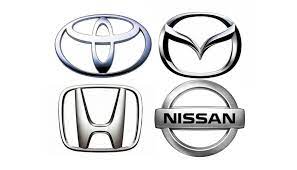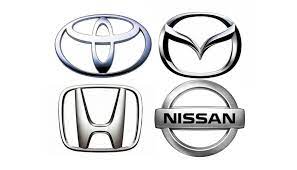
A quick switch to electric vehicles (EVs) has upended the world's largest auto market and resulted in a decline in purchases of gasoline-powered automobiles, data indicates, putting Japan's automakers in a sales crisis there.
According to industry data examined by Reuters, total sales of Japanese auto brands in China were down 32% year over year in the first quarter. This decline was more than twice as fast as the market's overall decline.
Other manufacturers, like Volkswagen AG, were also surprised by the abrupt change in China, but Japanese automakers stand out due to their modest sales performance in the rapidly expanding market for electric and plug-in hybrid vehicles.
In a concerning sign of the competition Japanese automakers may increasingly face outside of their home market, analysts predict that production and margins will be put under pressure in China as automakers reduce output and prices of gasoline-powered cars to keep inventories in check.
"Especially Japanese automakers face a little bit more inventory of new cars," in China, Yasushi Matsui, chief financial officer at parts supplier Denso Corp (6902.T), said last week. "They are making adjustments."
Last week, Mitsubishi Motors Corp. announced it will take a $77 million charge for sluggish sales at its joint venture with state-owned GAC Group and halt manufacturing of its Outlander SUV in China for three months.
Like some other Japanese automakers, Mitsubishi does not break separate sales numbers for China. According to industry data assessed by Reuters, its first-quarter sales in China decreased by 58% from the same period last year.
In a different development, the BYD Song, a plug-in hybrid produced by BYD, China's top automaker, pushed out Nissan's Sylphy, a sedan that had been the country's best-selling vehicle for three years, last year.
Nissan claimed in email responses that it had sold more than 5 million Sylphys in China over the years and that a hybrid electric-drive model qualified for incentives in Guangzhou.
The business claimed that it was coordinating similar support with other cities. According to Nissan, the sedan's hybrid electric-drive e-Power version will be key to the company's brand reinvention in China.
Toyota Motor Corp. claims that its cautious approach to all-electric vehicles protects consumer choice, but analysts claim that the tactic is costing the company sales in China.
"Japan is the biggest loser of the price war so far," said Bill Russo, founder and CEO of Automobility, a Shanghai-based consultancy.
"As EVs get more affordable, they become more attractive to the core buyers who have been resisting so far, the buyers of foreign brands. So, you can see the writing is on the wall."
According to industry data from the China Association of Automobile Manufacturers that Reuters reviewed, Japan's proportion of car sales in China dropped to 18.5% in the first quarter from 24% in 2020.
According to company figures, sales for Toyota and its luxury brand Lexus declined by 14.5% in the first quarter.
"We need to increase our speed and efforts to firmly meet the customer expectations in the Chinese market," Toyota CEO Koji Sato said in an interview last month.
Mazda Motor Corp. sales fell by 66.5% in the first quarter, and Nissan Motor Co. Ltd. reported a 45.8% decline in China sales. Industry data showed a 38.2% decline for Honda Motor Co Ltd.
Toshihiro Mibe, the CEO of Honda, acknowledged that the carmaker trailed behind Chinese rivals in some software developments.
Chinese automakers are "further ahead of us than we expected," Mibe told reporters at a presentation in Tokyo on Honda's initiatives in autonomous driving and services like gaming.
Masatoshi Nishimoto, chief research analyst at S&P Global Mobility in Tokyo, said that while low-cost electric cars and innovative products based on software have drawn consumers in China, Japanese manufacturers have built their name on qualities like durability.
"Japanese automakers could face a similar struggle in the United States as in China," he said.
(Source:www.autonews.com)
According to industry data examined by Reuters, total sales of Japanese auto brands in China were down 32% year over year in the first quarter. This decline was more than twice as fast as the market's overall decline.
Other manufacturers, like Volkswagen AG, were also surprised by the abrupt change in China, but Japanese automakers stand out due to their modest sales performance in the rapidly expanding market for electric and plug-in hybrid vehicles.
In a concerning sign of the competition Japanese automakers may increasingly face outside of their home market, analysts predict that production and margins will be put under pressure in China as automakers reduce output and prices of gasoline-powered cars to keep inventories in check.
"Especially Japanese automakers face a little bit more inventory of new cars," in China, Yasushi Matsui, chief financial officer at parts supplier Denso Corp (6902.T), said last week. "They are making adjustments."
Last week, Mitsubishi Motors Corp. announced it will take a $77 million charge for sluggish sales at its joint venture with state-owned GAC Group and halt manufacturing of its Outlander SUV in China for three months.
Like some other Japanese automakers, Mitsubishi does not break separate sales numbers for China. According to industry data assessed by Reuters, its first-quarter sales in China decreased by 58% from the same period last year.
In a different development, the BYD Song, a plug-in hybrid produced by BYD, China's top automaker, pushed out Nissan's Sylphy, a sedan that had been the country's best-selling vehicle for three years, last year.
Nissan claimed in email responses that it had sold more than 5 million Sylphys in China over the years and that a hybrid electric-drive model qualified for incentives in Guangzhou.
The business claimed that it was coordinating similar support with other cities. According to Nissan, the sedan's hybrid electric-drive e-Power version will be key to the company's brand reinvention in China.
Toyota Motor Corp. claims that its cautious approach to all-electric vehicles protects consumer choice, but analysts claim that the tactic is costing the company sales in China.
"Japan is the biggest loser of the price war so far," said Bill Russo, founder and CEO of Automobility, a Shanghai-based consultancy.
"As EVs get more affordable, they become more attractive to the core buyers who have been resisting so far, the buyers of foreign brands. So, you can see the writing is on the wall."
According to industry data from the China Association of Automobile Manufacturers that Reuters reviewed, Japan's proportion of car sales in China dropped to 18.5% in the first quarter from 24% in 2020.
According to company figures, sales for Toyota and its luxury brand Lexus declined by 14.5% in the first quarter.
"We need to increase our speed and efforts to firmly meet the customer expectations in the Chinese market," Toyota CEO Koji Sato said in an interview last month.
Mazda Motor Corp. sales fell by 66.5% in the first quarter, and Nissan Motor Co. Ltd. reported a 45.8% decline in China sales. Industry data showed a 38.2% decline for Honda Motor Co Ltd.
Toshihiro Mibe, the CEO of Honda, acknowledged that the carmaker trailed behind Chinese rivals in some software developments.
Chinese automakers are "further ahead of us than we expected," Mibe told reporters at a presentation in Tokyo on Honda's initiatives in autonomous driving and services like gaming.
Masatoshi Nishimoto, chief research analyst at S&P Global Mobility in Tokyo, said that while low-cost electric cars and innovative products based on software have drawn consumers in China, Japanese manufacturers have built their name on qualities like durability.
"Japanese automakers could face a similar struggle in the United States as in China," he said.
(Source:www.autonews.com)





